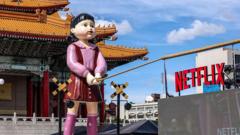Leading companies like Intel, Skechers, and Procter & Gamble are cutting or withdrawing profit forecasts, attributing the instability to unpredictable trade policies, with wider implications for the economy.
**US Companies Raise Alarm on Tariff Effects Amid Economic Uncertainty**

**US Companies Raise Alarm on Tariff Effects Amid Economic Uncertainty**
Executives from major US corporations express concerns regarding the detrimental impact of tariffs on their business operations and market forecasts.
Several executives from prominent US firms have voiced rising alarm over the adverse effects of tariffs imposed on key trading partners, signaling potential economic challenges ahead. Companies including technology leader Intel, footwear manufacturer Skechers, and consumer goods giant Procter & Gamble have either reduced their profit forecasts or opted to retract them, citing uncertainties in the economic landscape driven by ongoing tariff policies.
President Donald Trump has been applying tariffs as a tool to recalibrate trade relations with various countries. Yet, despite hopes for new trade agreements, particularly with South Korea, no definitive framework has been established yet. Intel's CFO, David Zinsner, highlighted during an investor call that the fluidity of these trade policies contributes to an increased likelihood of an economic slowdown, with recession risks escalating. Following his announcement of disappointing profit and revenue projections, Intel's shares fell more than 5% during extended trading hours.
In parallel, Skechers faced investor discontent after withdrawing its annual earnings forecast. The company’s COO, David Weinberg, remarked on the unpredictable business environment, emphasizing the challenges of making reliable projections in such a fluctuating context. Skechers' reliance on Asian manufacturing, especially in China, positions it in a precarious situation as tariffs exert pressure on production costs.
Procter & Gamble cautioned that tariffs could lead them to revise consumer pricing strategies in response to heightened material costs linked to their supply chains extending to China and other international sources. Their financial chief, Andre Schulten, indicated that actions will be taken to mitigate these impacts, signaling a possible increase in prices for their household products.
The volatility of trade regulations is also affecting the Japanese company Seven & I, which operates 7-Eleven stores across North America, signaling that over 70% of its revenue is generated from that region. Incoming CEO Stephen Dacus expressed his apprehensions regarding the consistency of the tariffs and how they could ultimately affect operational strategies.
The issue is becoming a global concern as Hyundai, the South Korean automotive powerhouse, announced the establishment of a task force to navigate the complications stemming from these trade conflicts. The firm anticipates ongoing challenges amid escalating trade disputes, which may result in shifts in manufacturing operations.
Concurrently, recent trade negotiations between U.S. and South Korean officials showed some early promise, with U.S. Treasury Secretary Scott Bessent declaring the discussions "very successful". Both parties appear optimistic about progressing toward resolving some of the tariff-related issues, with tangible outcomes anticipated in their future dialogues.
As the tension surrounding tariff enforcement continues, more than 70 nations have reached out to the U.S. to explore negotiating pathways, revealing an escalating global dialogue on trade practices.
President Donald Trump has been applying tariffs as a tool to recalibrate trade relations with various countries. Yet, despite hopes for new trade agreements, particularly with South Korea, no definitive framework has been established yet. Intel's CFO, David Zinsner, highlighted during an investor call that the fluidity of these trade policies contributes to an increased likelihood of an economic slowdown, with recession risks escalating. Following his announcement of disappointing profit and revenue projections, Intel's shares fell more than 5% during extended trading hours.
In parallel, Skechers faced investor discontent after withdrawing its annual earnings forecast. The company’s COO, David Weinberg, remarked on the unpredictable business environment, emphasizing the challenges of making reliable projections in such a fluctuating context. Skechers' reliance on Asian manufacturing, especially in China, positions it in a precarious situation as tariffs exert pressure on production costs.
Procter & Gamble cautioned that tariffs could lead them to revise consumer pricing strategies in response to heightened material costs linked to their supply chains extending to China and other international sources. Their financial chief, Andre Schulten, indicated that actions will be taken to mitigate these impacts, signaling a possible increase in prices for their household products.
The volatility of trade regulations is also affecting the Japanese company Seven & I, which operates 7-Eleven stores across North America, signaling that over 70% of its revenue is generated from that region. Incoming CEO Stephen Dacus expressed his apprehensions regarding the consistency of the tariffs and how they could ultimately affect operational strategies.
The issue is becoming a global concern as Hyundai, the South Korean automotive powerhouse, announced the establishment of a task force to navigate the complications stemming from these trade conflicts. The firm anticipates ongoing challenges amid escalating trade disputes, which may result in shifts in manufacturing operations.
Concurrently, recent trade negotiations between U.S. and South Korean officials showed some early promise, with U.S. Treasury Secretary Scott Bessent declaring the discussions "very successful". Both parties appear optimistic about progressing toward resolving some of the tariff-related issues, with tangible outcomes anticipated in their future dialogues.
As the tension surrounding tariff enforcement continues, more than 70 nations have reached out to the U.S. to explore negotiating pathways, revealing an escalating global dialogue on trade practices.






















